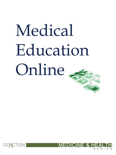
Medical Education Online
Scope & Guideline
Enhancing teaching methodologies in medicine for a brighter future.
Introduction
Aims and Scopes
- Innovative Teaching Methods:
The journal emphasizes the exploration and development of innovative teaching methodologies, including blended learning, flipped classrooms, and online education, aimed at improving student engagement and learning outcomes. - Assessment and Evaluation:
Research on various assessment strategies, such as competency-based evaluation and objective structured clinical examinations (OSCEs), is a core focus, aiming to enhance the reliability and validity of assessments in medical education. - Interprofessional Education:
There is a consistent emphasis on interprofessional education (IPE) to foster collaboration among healthcare professionals, enhancing teamwork and improving patient care outcomes. - Diversity, Equity, and Inclusion:
The journal highlights the importance of diversity, equity, and inclusion in medical education, addressing systemic biases and promoting equitable healthcare practices. - Mental Health and Well-being:
Research focusing on the mental health and well-being of medical students and healthcare professionals is a significant area of interest, exploring the impacts of stress, burnout, and institutional support. - Integration of Technology:
The journal explores the integration of technology in medical education, including the use of artificial intelligence, virtual reality, and online learning platforms to enhance training and educational experiences. - Patient-Centered Care:
There is a focus on developing curricula that emphasize patient-centered care, including communication skills and understanding the social determinants of health.
Trending and Emerging
- Online and Hybrid Learning Models:
The shift towards online and hybrid learning models has gained momentum, particularly post-COVID-19, with research focusing on effective online teaching strategies and student engagement in virtual environments. - Mental Health Awareness:
There is an increasing focus on the mental health and well-being of medical students, with studies exploring interventions and support systems to address issues of burnout and stress. - Competency-Based Education:
Competency-based education is becoming a prominent theme, with research aimed at redefining curricula to ensure that graduates possess the necessary competencies for effective practice. - Social Accountability in Medical Education:
The trend towards social accountability in medical education is gaining traction, emphasizing the need for curricula that address healthcare disparities and prepare students for community-oriented practice. - Integration of Artificial Intelligence:
The exploration of artificial intelligence in medical education is an emerging trend, with research investigating its potential to enhance learning experiences and assessment methods. - Patient-Centered and Inclusive Care:
There is a growing emphasis on patient-centered care and inclusivity in medical curricula, with studies advocating for training that addresses the needs of diverse populations. - Interprofessional Collaboration:
Research focusing on interprofessional collaboration is on the rise, highlighting the importance of teamwork among healthcare professionals to improve patient outcomes.
Declining or Waning
- Traditional Lecture-Based Learning:
There is a noticeable decline in research focused on traditional lecture-based learning formats, as more institutions adopt interactive and technology-driven educational approaches. - Standardized Testing Practices:
Research on standardized testing practices, particularly those that do not incorporate formative assessments or feedback mechanisms, has decreased, reflecting a shift towards more holistic and competency-based evaluations. - Cultural Competency Alone:
The focus on cultural competency as a standalone concept is waning, with increasing recognition of the need for a more integrated approach to diversity and inclusion that addresses systemic issues. - Passive Learning Techniques:
The prevalence of studies advocating for passive learning techniques, such as rote memorization, has diminished, as there is a stronger emphasis on active learning and student engagement. - Disciplinary Silos:
Research that maintains a strict focus on single disciplines without interdisciplinary collaboration is less common, indicating a trend towards integrated curricula that promote interprofessional education.
Similar Journals

International Journal of Mathematical Education in Science and Technology
Integrating Science and Mathematics for Future GenerationsThe International Journal of Mathematical Education in Science and Technology, published by TAYLOR & FRANCIS LTD, is a leading academic journal dedicated to the interdisciplinary field of mathematical education, emphasizing the integration of science and technology. With an ISSN of 0020-739X and E-ISSN 1464-5211, the journal serves as a vital resource for researchers, educators, and practitioners seeking innovative methodologies and pedagogical frameworks in mathematics education. As of 2023, it has achieved a prestigious standing in Q2 quartiles across three categories: Applied Mathematics, Education, and Mathematics (miscellaneous), with notable rankings in Scopus, including 16th in Mathematics and 486th in Social Sciences Education. The journal, which has been converging its research and findings since 1970 and will continue to do so until 2024, is not available as an open access publication, but offers a wealth of insights for those committed to enhancing mathematical understanding in various educational contexts. Its emphasis on cutting-edge research makes it a crucial conduit for advancements in both theoretical and practical aspects of mathematics education.

JOURNAL OF FURTHER AND HIGHER EDUCATION
Shaping the Future of Educational ExcellenceJournal of Further and Higher Education, published by Routledge Journals, Taylor & Francis Ltd, stands as a prominent platform in the field of education, with a distinguished focus on further and higher education studies. With an ISSN of 0309-877X and E-ISSN of 1469-9486, this journal has been contributing invaluable insights since its inception in 1977. The journal boasts a remarkable Q1 ranking in its category for 2023, placing it in the top tier of educational research, underscored by its 83rd percentile ranking among Scopus Ranks in Social Sciences - Education. Researchers and practitioners alike are encouraged to submit their work, as the journal aims to foster innovative discussions and disseminate high-quality scholarly articles that address contemporary challenges in further and higher education. With its commitment to academic excellence, Journal of Further and Higher Education plays a crucial role in shaping policy and practice in the educational landscape, ensuring that the voices of educators and learners are heard and valued.
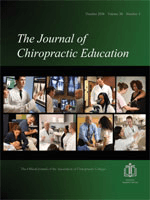
Journal of Chiropractic Education
Connecting research and practice in chiropractic education.Welcome to the Journal of Chiropractic Education, a pivotal academic platform dedicated to advancing the field of chiropractic education and practice. Published by BRIGHTHALL & ALLEN PRESS PUBL SERVICES, this journal boasts an ISSN of 1042-5055 and an E-ISSN of 2374-250X, ensuring a broad accessibility for researchers, educators, and healthcare professionals. With a distinguished ranking in the third quartile within the chiropractic category in 2023, and a notable position as the 5th in Scopus rankings for Health Professions in Chiropractics, the journal serves as a vital resource for innovative research and comprehensive reviews. Spanning a converged period from 2017 to 2023, it emphasizes the importance of evidence-based practices and educational methodologies that enhance chiropractic training. Although the journal is not openly accessible, it continues to strive towards fostering an engaged academic community dedicated to the growth and evolution of chiropractic education. Join us as we explore the latest findings, share insights, and elevate the standards of chiropractic practice through rigorous scholarship.

AEM Education and Training
Shaping the future of emergency medicine through impactful research.AEM Education and Training is a leading peer-reviewed journal published by WILEY, focusing on the intersection of education, emergency medicine, and nursing, with a commitment to advancing knowledge and practice in these critical fields. Launched in 2017, this journal has quickly established itself as a key resource, as evidenced by its impressive Q2 ranking in both Education and Emergency Medicine, and a top-tier Q1 ranking in Emergency Nursing as of 2023. The journal aims to disseminate high-quality research that enriches educational practices and improves clinical outcomes, serving as a vital platform for healthcare educators and practitioners. With the growing importance of effective training in emergency settings, AEM Education and Training plays an essential role in shaping future leaders in health education and patient care. Researchers, professionals, and students will find an array of insightful articles that address contemporary challenges and innovations in their fields. Although currently not an open-access journal, its findings contribute significantly to the broader discourse in educational practices and emergency care.
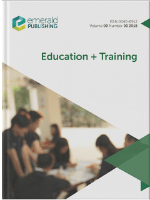
Education and Training
Elevating educational practices with scholarly contributions.Education and Training is a leading peer-reviewed journal published by Emerald Group Publishing Ltd, dedicated to advancing the fields of education and professional development. With an impressive impact factor and recognized as a Q1 journal in both Business, Management, and Education, it serves as a crucial resource for researchers, educators, and practitioners. The journal's rich history, dating back to 1959, reflects its enduring commitment to delivering high-quality, research-driven insights that inform educational practices and management strategies. The Scopus rankings further affirm its significance in the academic community, showcasing its competitive position within the social sciences. Notably, the journal does not currently offer open access options, ensuring a curated audience of scholarly individuals who value rigorous academic contributions. By providing a platform for innovative research and thought leadership, Education and Training continues to shape the discourse on effective educational methodologies and enhance lifelong learning across various contexts.

International Journal of Academic Medicine
Inspiring future innovations in healthcare practices.International Journal of Academic Medicine, published by Wolters Kluwer Medknow Publications, serves as a pivotal platform for the dissemination of research and dialogue in the realms of medical education and health sciences. With an Open Access model and an E-ISSN of 2455-5568, this journal aims to enrich the academic community by sharing innovative findings and educational methodologies since its inception in 2019, continuing to persist through 2024. Categorized in the fourth quartile in both Education and Health (Social Science) for 2023, and demonstrating impressive rankings within the Scopus database—such as #333 among general medicine journals—this publication is positioned as a rising contributor to interdisciplinary scholarship. Based in India, it addresses the evolving challenges and opportunities within academic medicine, making it a vital resource for researchers, healthcare professionals, and students committed to advancing medical education and fostering better healthcare practices globally. Explore this journal to engage with a diverse array of scholarly articles that push the boundaries of conventional knowledge and inspire future innovations.

GMS Journal for Medical Education
Transforming Medical Training Through InnovationGMS Journal for Medical Education, published by GERMAN MEDICAL SCIENCE-GMS, stands as a pivotal platform for innovative research and discourse in the realm of medical education. With an ISSN of 2366-5017, this Open Access journal has been serving the global academic community since 2016, ensuring that critical information remains accessible to all stakeholders in the field. Located in Germany, this journal is dedicated to advancing knowledge and best practices in educational methodologies, policies, and research, garnering a commendable Q2 rank in Education and a Q3 in Medicine for 2023. As a reputable source in Scopus, where it ranks #462 out of 1543 in Social Sciences - Education, the GMS Journal for Medical Education invites researchers, educators, and students alike to contribute to its mission of enhancing medical training and fostering educational excellence, particularly as it approaches its converged years from 2016 to 2024. This journal not only serves as a rich resource for academic advancement but also stimulates essential conversations that shape the future of medical education worldwide.
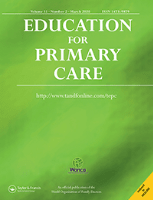
Education for Primary Care
Innovating Education for Tomorrow's Healthcare LeadersEducation for Primary Care, published by Taylor & Francis Inc, is a prominent peer-reviewed journal that has significantly contributed to the fields of Family Practice and Public Health since its inception in 2001. With an ISSN of 1473-9879 and an E-ISSN of 1475-990X, this journal offers a platform for researchers, healthcare professionals, and educators to share innovative practices, research findings, and educational advancements relevant to primary care. Holding a commendable Q2 ranking in Family Practice and Q3 in Public Health categories, Education for Primary Care emphasizes the interconnection between education and clinical practice, addressing crucial issues in health promotion and service delivery. Although it operates under a subscription model, the journal remains an essential resource for staying abreast of contemporary educational strategies and developments, ensuring that readers are well-equipped to enhance their practice and improve patient care outcomes. The journal aims to foster a dialogue among interdisciplinary stakeholders, making it a vital component of the academic conversation surrounding primary healthcare education.
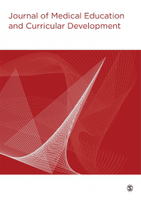
Journal of Medical Education and Curricular Development
Exploring Cutting-Edge Strategies in Medical TrainingJournal of Medical Education and Curricular Development is a pioneering open-access journal published by SAGE Publications Ltd, dedicated to advancing the field of medical education. With an ISSN of 2382-1205, this journal has been committed to providing high-quality, peer-reviewed research since 2014. It serves as a vital platform for educators, researchers, and practitioners interested in innovative teaching methodologies, curriculum development, and assessment strategies in medical education. The journal not only aims to disseminate impactful research but also encourages scholarly dialogue on best practices and emerging trends in the field. By offering unrestricted access to published articles, it ensures that knowledge is widely accessible, promoting collaboration and improvement in medical training worldwide. As a key resource for professionals and academics alike, it supports the ongoing evolution of educational practices that directly influence healthcare outcomes.
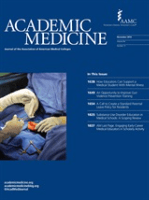
ACADEMIC MEDICINE
Driving Innovation in Medical Training and ResearchACADEMIC MEDICINE is a premier journal published by Lippincott Williams & Wilkins, focusing on the multifaceted realm of medical education and training. Since its inception in 1940, the journal has become an essential resource for researchers, educators, and healthcare professionals dedicated to advancing the field of academic medicine. With an impressive Q1 ranking in both Education and Miscellaneous Medicine categories as of 2023, it ranks among the top publications in its field, reflective of its significant academic impact. The journal is indexed in Scopus, where it holds a commendable position within the 93rd percentile of Social Sciences Education, affirming its influence on contemporary medical education discourse. While not an open-access journal, ACADEMIC MEDICINE is committed to disseminating high-quality research, fostering knowledge exchange, and encouraging innovation in medical training across the globe. It serves as a critical platform for sharing the latest findings and practical insights in medical education, making it an indispensable resource for scholars and practitioners aiming to enhance their academic and clinical expertise.